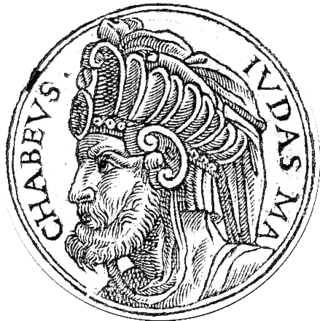Related Research Articles

The 2nd century BC started the first day of 200 BC and ended the last day of 101 BC. It is considered part of the Classical era, although depending on the region being studied, other terms may be more suitable. It is also considered to be the end of the Axial Age. In the context of the Eastern Mediterranean, it is the mid-point of the Hellenistic period.

This article concerns the period 49 BC – 40 BC.
This article concerns the period 169 BC – 160 BC.
This article concerns the period 179 BC – 170 BC.
Year 219 BC was a year of the pre-Julian Roman calendar. At the time it was known as the Year of the Consulship of Paullus and Salinator. The denomination 219 BC for this year has been used since the early medieval period, when the Anno Domini calendar era became the prevalent method in Europe for naming years.
Year 160 BC was a year of the pre-Julian Roman calendar. At the time it was known as the Year of the Consulship of Gallus and Cethegus and the Fourth Year of Houyuan. The denomination 160 BC for this year has been used since the early medieval period, when the Anno Domini calendar era became the prevalent method in Europe for naming years.
Year 163 BC was a year of the pre-Julian Roman calendar. At the time it was known as the Year of the Consulship of Gracchus and Thalna and the First Year of Houyuan (後元). The denomination 163 BC for this year has been used since the early medieval period, when the Anno Domini calendar era became the prevalent method in Europe for naming years.
Year 164 BC was a year of the pre-Julian Roman calendar. At the time it was known as the Year of the Consulship of Torquatus and Longinus. The denomination 164 BC for this year has been used since the early medieval period, when the Anno Domini calendar era became the prevalent method in Europe for naming years.
Year 166 BC was a year of the pre-Julian Roman calendar. At the time it was known as the Year of the Consulship of Marcellus and Galus. The denomination 166 BC for this year has been used since the early medieval period, when the Anno Domini calendar era became the prevalent method in Europe for naming years.

Year 168 BC was a year of the pre-Julian Roman calendar. At the time it was known as the Year of the Consulship of Macedonicus and Crassus. The denomination 168 BC for this year has been used since the early medieval period, when the Anno Domini calendar era became the prevalent method in Europe for naming years.

Antiochus IV Epiphanes was a Greek Hellenistic king who ruled the Seleucid Empire from 175 BC until his death in 164 BC. He was a son of King Antiochus III the Great. Originally named Mithradates, he assumed the name Antiochus after he ascended the throne. Notable events during Antiochus's reign include his near-conquest of Ptolemaic Egypt, his persecution of the Jews of Judea and Samaria, and the rebellion of the Jewish Maccabees.

The Maccabees, also spelled Machabees, were a group of Jewish rebel warriors who took control of Judea, which at the time was part of the Seleucid Empire. They founded the Hasmonean dynasty, which ruled from 167 BCE to 37 BCE, being a fully independent kingdom from about 110 to 63 BCE. They reasserted the Jewish religion, partly by forced conversion, expanded the boundaries of Judea by conquest and reduced the influence of Hellenism and Hellenistic Judaism.

The Hasmonean dynasty was a ruling dynasty of Judea and surrounding regions during classical antiquity, from c. 140 BCE to 37 BCE. Between c. 140 and c. 116 BCE the dynasty ruled Judea semi-autonomously in the Seleucid Empire, and from roughly 110 BCE, with the empire disintegrating, Judea gained further autonomy and expanded into the neighboring regions of Perea, Samaria, Idumea, Galilee, and Iturea. Some modern scholars regard the Hasmonean realm as an independent Israel. The Hasmonean rulers took the Greek title basileus. Forces of the Roman Republic conquered the Hasmonean kingdom in 63 BCE and made it into a client state; Herod the Great displaced the last reigning Hasmonean client-ruler in 37 BCE.

Lucius Aemilius Paullus Macedonicus was a two-time consul of the Roman Republic and a general who conquered Macedon, putting an end to the Antigonid dynasty in the Third Macedonian War.
The Third Macedonian War was a war fought between the Roman Republic and King Perseus of Macedon. In 179 BC, King Philip V of Macedon died and was succeeded by his ambitious son Perseus. He was anti-Roman and stirred anti-Roman feelings around Macedonia. Tensions escalated and Rome declared war on Macedon.

Judah Maccabee was a Jewish priest (kohen) and a son of the priest Mattathias. He led the Maccabean Revolt against the Seleucid Empire.

Mattathias ben Johanan was a Kohen who helped spark the Maccabean Revolt against the Hellenistic Seleucid Empire. Mattathias's story is related in the deuterocanonical book of 1 Maccabees. Mattathias is accorded a central role in the story of Hanukkah and, as a result, is named in the Al HaNissim prayer Jews add to the Birkat Hamazon and the Amidah during the festival's eight days.
A synedrion or synhedrion is an assembly that holds formal sessions. The Latinized form is synedrium.
Charops or Charopus is the name of two statesmen in 2nd century BC of the Epirote League, grandfather and grandson; both of them had the patronymic Machatas.
Gnaeus Octavius was a Roman politician and general who served as consul in 165 BC and was the builder of the Porticus Octavia.